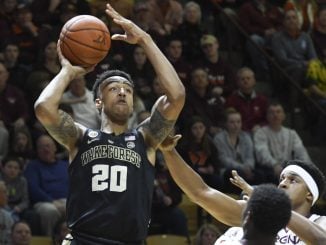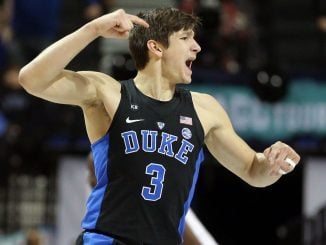Wake Forest and Duke are usually something of an afterthought on college football Saturdays compared to in-state rivals with larger, more vocal fan bases.
This weekend, however, their home games are likely to garner significantly more interest — especially among athletic officials at North Carolina, NC State, East Carolina, Appalachian State and Charlotte.
They won’t be as interested in the play on the field as much as the protocols in the stands when the Deacons and Blue Devils become the first athletic entities in the state to have home events with a limited number of fans in attendance.
“We’ve been watching and monitoring games across the country since football restarted and we’ll continue to have conversations with our colleagues,” said Robbi Pickeral Evans, UNC’s associate athletic director for strategic communications and special assistant to athletic director Bubba Cunningham. “Not all experiences translate, but these conversations are certainly helping us inform our planning and execution.”
UNC and others around the state played their home football games in September without fans in the stands. But now that Gov. Roy Cooper has relaxed coronavirus restrictions on public gatherings, crowds of up to 7% capacity at large outdoor venues holding 10,000 or more spectators are permitted.
The new guidelines go into effect on Friday.
Since UNC isn’t scheduled to play again at Kenan Stadium until next week and State has two more weeks before returning to Carter-Finley Stadium, officials there will have the benefit of learning from the experiences of others before hosting games of their own.
Wake Forest’s rescheduled game against Campbell on Friday will be one of the trial balloons they’ll be closely watching.
According to Deacons athletic director John Currie, about 2,200 tickets will be made available, with all seating assigned to provide for efficient contact tracing, if necessary. Truist Field has a published capacity of 31,500.
The highest priority in the distribution of tickets will go to the parents of players on both teams, with 750 seats allocated to Wake students. The rest will be distributed among season ticket holders.
Masks will be required of all in attendance.
“Led by our associate AD Ellie Shannon, our staff has been both diligent and creative over the past six months to develop extensive and flexible social distancing plans that meet or exceed the standards of local and state health authorities and enable us to safely host student-athletes’ parents and families and a limited number of students and fans inside all our venues,” Currie said.
“We believe that Deacon Nation will follow the example of our student-athletes in adhering to our COVID-19 risk mitigation measures, including mandatory mask wearing and social distancing.”
Because Duke’s Wallace Wade Stadium, with a capacity of 40,000, is slightly bigger than Wake’s home field, 2,800 will be able to attend Saturday’s game against Virginia Tech.
The Blue Devils, however, have not publicly announced their policy on who will have access to tickets and what protocols they will be required to follow once they enter the gate. Because of standards set by both the state and ACC, they are likely to be similar to those in place at Wake, UNC and State.
On the professional side, the Carolina Panthers have already prepared Bank of America Stadium with hand sanitizing stations and signage instructing fans that do attend, starting with Sunday’s game against the Arizona Cardinals, aware of social distancing rules that are being put in place.
The Panthers have also teamed up with Honeywell to distribute personal protective equipment packs for fans and staff members as they enter the stadium.
With a capacity of 75,412, Bank of America Stadium can accommodate 5,278 personal seat license holders — each of whom will be given the option of attending two home games for the remainder of the season.
Even more fans will be able to get into the stands for the upcoming NASCAR Roval 400 at 100,000-seat Charlotte Motor Speedway on Oct. 11.
Unlike the college football teams around the state, officials at CMS already have a working plan in place for the “new normal,” thanks to races already held at its sister tracks owned by Speedway Motorsports, LLC.
“We’ve had some key learnings from our sister tracks including Bristol, New Hampshire and Texas, who have each successfully hosted fans during the pandemic,” CMS executive vice president and general manager Greg Walter said. “We look forward to implementing those ideas, among others, to be sure that fans can focus on fun while they’re here.”
While the financial impact of having such a small number of paying customers in attendance isn’t likely to make a dent in the losses suffered by all sports entities around the state — especially the colleges — every little bit is bound to help.
But according to Panthers owner David Tepper, having fans returning to the stands has benefits that go far beyond the bottom line.
“I don’t love all the red ink that we’re going to see this year, but I hate more not seeing the fans in the building,” Tepper said last month. “I have other means. I do have other businesses. I’m using this for the fans and for football.”




